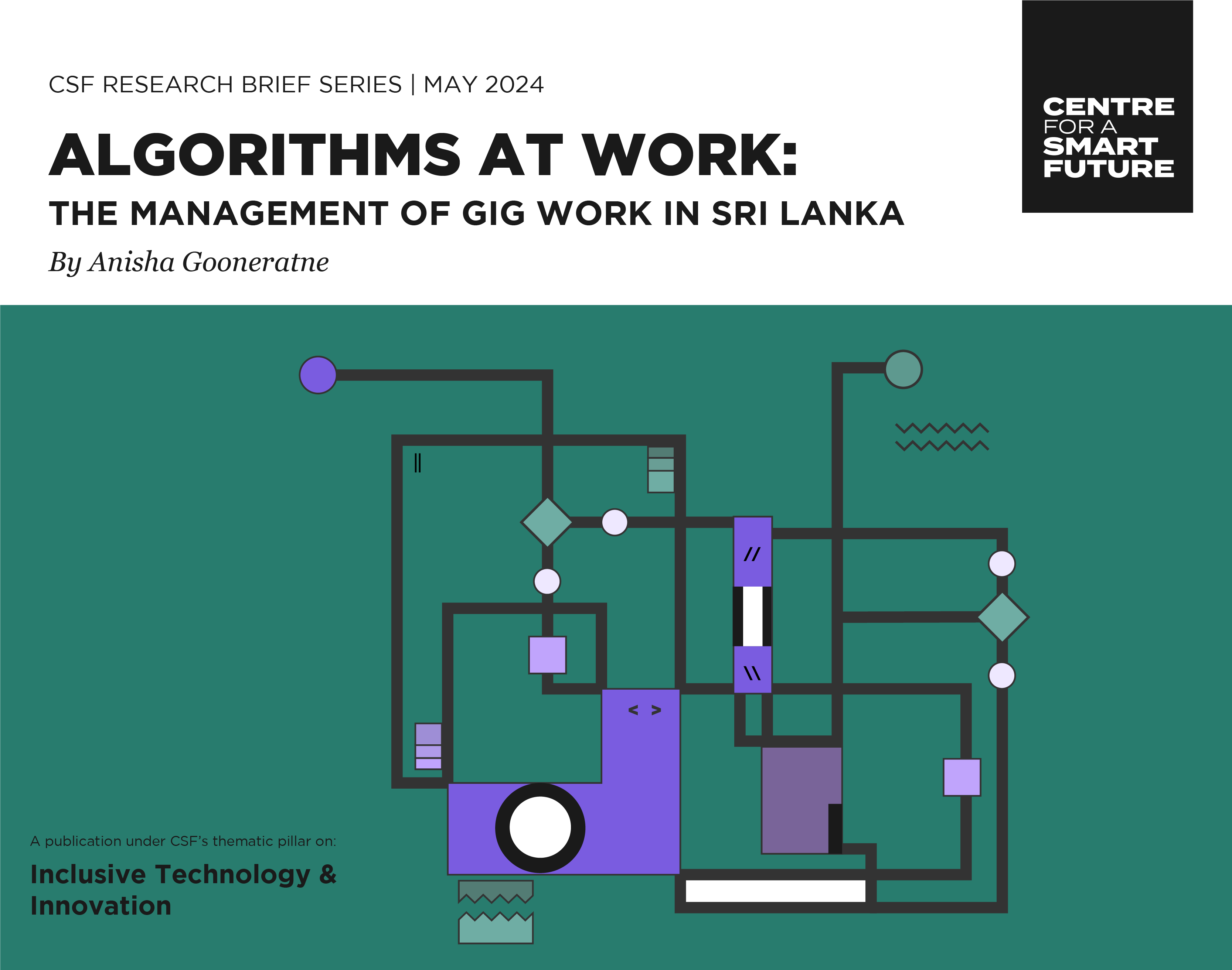
- Home
- Knowledge Insights
- Four Ways The World Is Making Gig Work Fairer
For years, platform work has been celebrated as the new frontier of flexibility. It has acted as a promise that anyone, anywhere, could log in, earn, and opt out all at their own will – the gig economy. However, across continents, governments are beginning to ask: flexibility for whom and flexibility at what cost?
Behind every app-based delivery, ride, or freelance task lies a growing tension between innovation and protection, autonomy and algorithmic control, freedom and fairness. As the ILO notes, today’s platforms use algorithmic systems to “organize, assign, monitor, supervise and evaluate work,” shifting real power into black-box decision-making (International Labour Organization, 2024).
In Sri Lanka and across emerging economies, gig work often serves as a key source of income for those excluded from formal employment. However, it does so while exposing workers to economic insecurity, inconsistent hours, and heightened vulnerability to external shocks (Pathirage, 2024). In turn, this has led to gig workers becoming the invisible infrastructure of many cities. Yet, their rights remain undefined, their incomes uncertain, and their exposure to risk unchecked.
This moment of reckoning has triggered a wave of global experimentation. From Asia to Europe and Latin America, governments are testing new regulatory tools to bring a sense of accountability, transparency, and dignity to platform work. These efforts do not seek to dismantle the gig economy, but rather to rebalance it. The following four examples illustrate how countries are attempting to move toward fairer systems of digital labour.
Opening the Black Box of Algorithmic Governance
The first frontier in regulating platform work has been the algorithm itself. What determines when a rider receives an order, or why one driver earns more than another? For years, these digital decision-makers operated behind corporate secrecy clauses. Now, regulators are prying open that black box. In a landmark piece of legislation, The European Union’s Platform Workers Directive (2024) introduces obligations for platforms to disclose their use of automated decision-making, ensuring workers understand how algorithms allocate work, monitor performance, and determine pay. It also gives workers the right to contest automated decisions. This EU decision has set the global stage for addressing algorithmic opacity. Furthermore, the Directive establishes a rebuttable presumption of employment. This essentially means that unless a platform can prove otherwise, workers are presumed employees, marking a paradigm shift in how gig workers on platforms are classified and putting worker protection up front.
Spain’s ‘riders’ law (2021) followed a similar path, as it recognised the right to algorithmic transparency at a national level for the first time. This forces every type of platform to inform the (platform) workers’ legal representatives about the inner functioning of the algorithms ‘that may affect working conditions, and access to and maintenance of employment, including profiling’ (Article 64.4. of the Workers’ Statute1).
Closer to home, India’s Karnataka Platform-Based Gig Workers (Social Security and Welfare) Bill 2025 goes a step further, demanding that companies disclose what personal data they collect, how it is used to allocate tasks, and why work is denied. This is not just about compliance, but rather it signals a kind of philosophical shift. For the longest time, platforms justified opacity as a matter of ‘intellectual property’ Today, algorithmic transparency is being redefined as a labour right by many of these laws and regulations, making it a way for workers to actually understand and challenge the digital systems that govern their work on platforms.
Redrawing Employment Lines and Re-defining Independence
The second frontier concerns what gig workers are called and what that means for their protections. The global regulatory landscape is divided between those insisting gig workers are ‘employees’ and those creating a new ‘third category’.
In the United States, California’s Assembly Bill 5 (AB 5) in 2020 introduced the “ABC test,” to determine whether a worker is an ‘employee’ or an ‘independent contractor’. Though this law sought to curb the misclassification in platform based gig work, its rollout has not been smooth. Five years later, we see that California has not enforced the law across all sectors and that it continues to face challenges in court as well as resistance from industry groups. That being said, experts believe that AB5 is not going away. It remains a defining case of how far governments can go in redrawing the boundaries of employment in a digital age and acts as a template for reform. Spain’s “Ley Rider” offers a more contrasting path as it automatically classifies platform workers as employees. Furthermore, in the United Kingdom, the Supreme Court’s landmark Uber BV v Aslam (2021) case held that Uber drivers qualified as “workers” under UK labour law, entitling them to minimum wage and paid holidays.
These reforms have faced stiff opposition from platform companies, who argue that rigid classification threatens flexibility and profitability. One of the hallmarks of the model of platform-based gig work, which enabled its rapid proliferation, has been the ‘independent contractor’ approach that allows workers to opt in and opt out from work based on their convenience and interest. Increasingly in many countries, however, gig work has become a de facto full-time job. This is borne out in our research in Sri Lanka too.
The ongoing global debates have catalysed a conversation about a possible middle ground — “dependent contractors”. The independent Taylor Review of Modern Working Practices (2017) in the UK recommended the renaming of workers who are not employees to “dependent contractors” in order to provide clarity and strengthen the enforcement of associated rights. This concept has already been recognized in Canada, Germany and South Korea among others.
In embracing this idea, gig workers would be considered formally independent, but entitled to baseline benefits and bargaining rights.
Building Safety Nets for the Digital Age
Even where workers remain classified as independent, governments are finding ways to extend protection. The Indian Social Security Code (2020) was among the first in Asia to explicitly recognise ‘unorganised, gig, and platform workers’ as beneficiaries of national welfare schemes, mandating a Social Security Fund financed through contributions by digital platforms. The Karnataka Platform Based Gig Workers (Social Security and Welfare) Bill (2025) builds on this framework, requiring platforms to contribute to a welfare board which effectively introduces a small tax on digital labour for public good. Implementation challenges remain, but the recognition itself is transformative because it shifts welfare from employer obligation to ecosystem responsibility.
Singapore’s Platform Workers Bill (2025) takes a pragmatic hybrid approach where they are creating a new category between employee and self-employed person, with mandatory contributions to the Central Provident Fund (CPF) by both worker and platform. The reform ensures access to retirement, housing, and health benefits without dismantling flexibility.
Meanwhile, Brazil has advanced a landmark law establishing minimum pay, accident insurance, and collective bargaining rights for app-based couriers and drivers. It marks a sharp break from years of laissez-faire policies. As one courier wrote in The Guardian (April, 2025): “For the first time, the right to a fair day’s pay and protection is written into the law, not the goodwill of an app.”
These examples point to a shift in mindset, where social protection is no longer tethered solely to formal employment. In many ways, this reflects a broader truth – that the 20th-century binary of ‘employee’ versus ‘self-employed’ no longer fits a 21st-century workforce managed by apps, rather than offices. As work becomes more fluid, welfare must become adaptable.
Recognizing Occupational Risks from Climate Impacts
If transparency and rights define the legal frontier, climate defines the existential one. Gig work is not just precarious, it is also becoming increasingly perilous. In much of the Global South, delivery riders, drivers, and logistics workers face daily struggles with extreme heat, flooding, and pollution among several other climate stresses.
The CSF report ‘Flexibility and Fairness in Platform Labour: Navigating Gig Work in Colombo’, calls climate change a “wicked multiplier” further amplifying the risks faced by those already excluded from formal protection.
Countries are beginning to respond to this issue. In Vietnam, Grab implemented a “heat surcharge” in 2022 to compensate drivers who worked in extreme temperatures (Vu and Ngyuen, 2025). The surcharge raised a lot of questions, especially on whether delivery partners would receive the full benefit of the surcharge. Though it was a step in the right direction, it was soon removed due to limitations in the system setup (Vietnam News, 2022). In India, delivery services like Zomato have started encouraging customers to avoid placing orders when temperatures reach extreme levels. This recognition proves to be somewhat symbolic because it is signaling a shift in perspective — recognizing workers well being and not just consumer convenience.
CSF’s recommendations echo the fact that platform companies should adjust algorithms during heatwaves to avoid penalising slower deliveries, and invest in cooling infrastructure, hydration stations, and safety communication in local languages.
As the climate crisis intensifies, gig workers are on the frontlines – their labour essential, and their exposure extreme. Recognising this link between labour rights and climate resilience may be the next major step in platform regulation.
From Exceptional to Expected
Across these four fronts – algorithm transparency, worker reclassification, social protection, and occupational safety one pattern emerges: regulating platform work is no longer unusual or exceptional – it is becoming more prevalent, and indeed inevitable.
While countries are taking different legislative and regulatory approaches, they appear to share a common moral foundation: that platform work is work, and work deserves protection. The gig economy’s promise of flexibility need not vanish, but its fairness must be redefined.
For Sri Lanka and other emerging digital economies across the world, the question is not whether to think about the need for regulation or not, but rather how to actually go about it in a way that honours both sides of the story – embracing the freedom and opportunity that platform work can offer, while anchoring those opportunities in fairness and equity. In the years ahead, it is going to be essential to create frameworks that balance innovation with dignity – one that recognises both the promise and the precarity of platform labour.
This article was written by Tehani Chandrasena Perera (Junior Researcher, CSF) and draws from research conducted for CSF’s recent research publication – ‘Flexibility and Fairness in Platform Labour: Navigating Gig Work in Colombo’ and benefited from research by from Sheriah Peries (Visiting Researcher, CSF).
Cover image: A gig worker in India packs an order for delivery. Image credit (c) Rupinder Singh/Pexels, originally appearing in The India Forum.


